
Howard Zinn: The People’s Historian
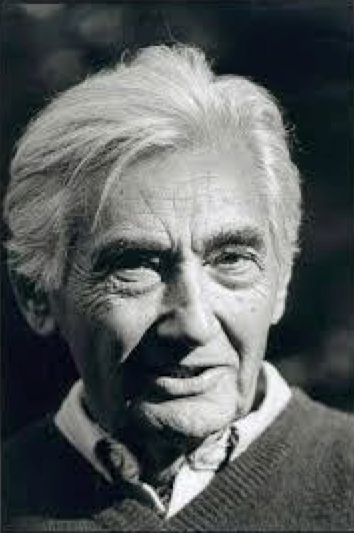
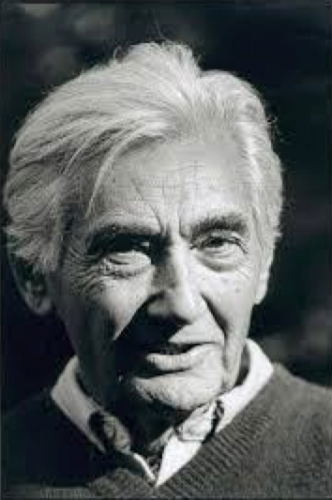
Historian, activist, playwright, expert witness, and Red Sox fan Howard Zinn passed away on January 27, 2010, leaving a legacy of provocative scholarship and exemplary advocacy for social and economic justice, antimilitarism, and anti-imperialism. His magnum opus, A People’s History of the United States: 1492 to the Present, has been a perennial bestseller since its publication in 1980, having sold more than 2 million copies. Its great achievement has been not only to make the study of history palatable in a culture not so inclined, but also to make its revisionist posture accessible—viewing American history from the point of view of ordinary people, often the marginalized and disenfranchised.
In addition, A People’s History spawned a bibliographical cottage industry of people’s histories—the world, the American Revolution, sports, art, baseball, Christianity, and hockey. And you can even find a People’s Museum in Manchester, England.
In addition to viewing history from the bottom up, Howard Zinn believed grassroots movements could be engines for social change. As a professor at Spelman, a black women’s college in Atlanta in the late fifties, Zinn was an advisor to campus activists—at the time a dicey activity, both because of Spelman’s conservative values and the dangers of agitating for civil rights in the deep South. He also was involved with the Student Nonviolent Coordinating Committee (SNCC), one of the organizations spearheading the evolving movement for African-American equality. Later, Zinn was a tireless protester against the war in Vietnam, both as a speaker and as a participant in marches and teach-ins. He also continued his peace activism, protesting US incursions in Central America and, of course, Iraq and Afghanistan. Not to be ignored was Zinn’s ceaseless support of labor unions and worker organizing efforts. Some of his most prominent battles were those around Boston University’s anti-union stances, with a longstanding adversarial relationship with that school’s contentious president, John Silber.
I first met Zinn in 1976 as a nighttime graduate student. Much later, I “interviewed” him four or five times from the mid-90s through 2008, and came to look upon him as a friend and mentor. (He and his wife, Roz, came to my son Cuba’s first birthday party.) The overarching sense I have of Zinn was of his fundamental decency and the ease with which his principles were applied in the practice of his daily life.
Though he was not an academic scholar (meaning he did not devote himself to poring over primary source material), he had a significant historiographical body of work, which was complemented with a weighty collection of speeches and lectures. He was also called upon as an expert witness in, among others, Daniel Ellsberg’s Pentagon Papers trial. Thus, his approach to doing history and his commitment to fomenting social change stimulated some rancorous criticism in academia and government.
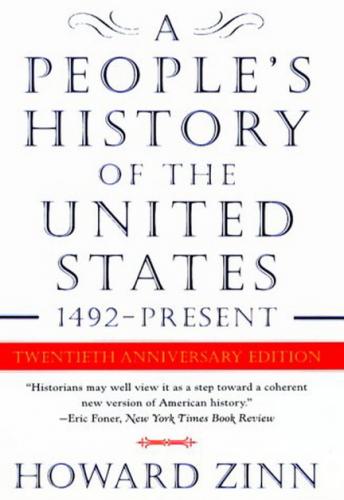
A People’s History of the United States: 1492 to Present by Howard Zinn (HarperCollins). This has gone through a number of editions and has been widely used as a textbook across the country. Recently, former governor Mitch Daniels of Indiana, who is president of Purdue University, reportedly engaged in a campaign to ban Zinn’s works from being taught in Indiana schools. Daniels wrote in an e-mail,
It is a truly execrable, anti-factual piece of disinformation that misstates American history on every page. Can someone assure me that it is not in use anywhere in Indiana? If it is, how do we get rid of it before more young people are force-fed a totally false version of our history?
Then there is Harvard historian Jill Lepore:
Zinn doesn’t come up in scholarly journals, but he introduced a whole lot of people who hadn’t thought about it before to the idea that history has a point of view. Kids can figure this out all on their own, but it’s nice to read it in a book.
The problem is that, analytically, upending isn’t an advance; it’s more of the same, only upside-down. By sophomore year, the young whippersnappers have figured that out, too, which can be heartbreaking to watch, but it doesn’t make them any less grateful for what Zinn taught them, or any less fond of him for having braved it.
It greatly amused Zinn that A People’s History’s publisher, HarperCollins, celebrated the book’s surpassing sales of a million copies with a media-grabbing soiree. HarperCollins is, of course, owned by Rupert Murdoch.
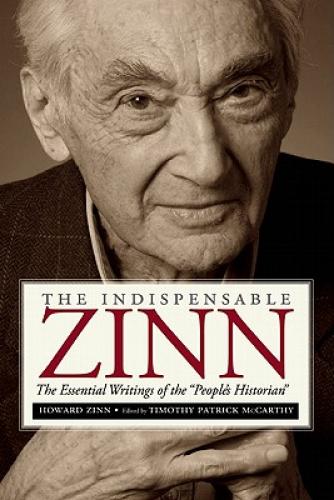
The Indispensable Zinn: The Essential Writings of the “People’s Historian” by Timothy Patrick McCarthy (The New Press). This volume, prefaced by Alice Walker, former Spelman College student and longtime friend, is a useful primer and anthology that serves to introduce Zinn to new readers.
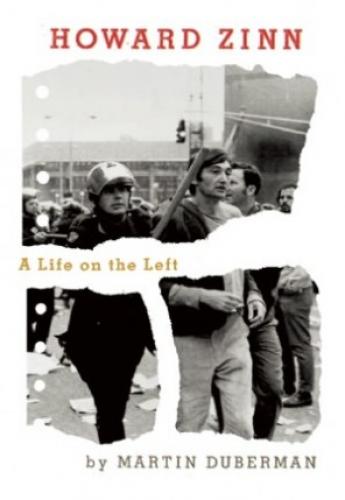
Howard Zinn: A Life on the Left by Martin Duberman (The New Press). Scholar, gay-rights activist, biographer, and playwright Martin Duberman published the first biography of Zinn in 2012. Authorized by Zinn’s children, he had access to previously closed archives and never-before-published photographs, though it is worth noting that Zinn destroyed his personal archives before his death. It is a reasonable survey of a life that was lived close to the major events of the twentieth century. Doberman’s brief account is a measured portrayal (although he harps on Zinn’s failure to commit to gay and gender issues), and he brings up the old and discredited allegations of an improper affair with a student at Spelman.
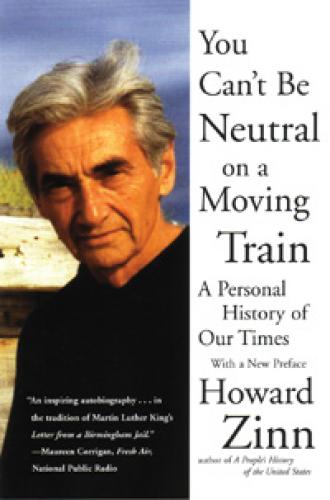
You Can’t Be Neutral on a Moving Train: A Personal History of Our Times by Howard Zinn (Beacon Press). Zinn’s memoir covers the major facets of his life as a teacher, writer, and activist, and expresses both his point of view and his counsel to students of history. From his working-class background to his World War II experience as an Air Force bombardier (his last mission was to napalmed German troops in France near the end of the war) to the antiwar movement, this tome is a useful bookend to the Duberman biography. Above all, it vividly displays his buoyant view of social change:
We don’t have to engage in grand, heroic actions to participate in the process of change. Small acts, when multiplied by millions of people can transform the world.
To be hopeful in bad times is not just foolishly romantic. It is based on the fact that human history is a history not only of cruelty but also of compassion, sacrifice, and courage, kindness.
Howard Zinn: You Can’t Be Neutral on a Moving Train directed by Deb Ellis, Denis Mueller (First Run Features). This 2004 DVD documentary loosely follows the narrative of Zinn’s memoir with real benefits to be found in the extra material—speeches and lectures showing the mild-mannered Zinn as calm and humorous, not at all the stereotype of the bomb-throwing, tennis-shoe-wearing anarchist.

Howard Zinn Speaks: Collected Speeches 1963–2009 by Howard Zinn, edited by Anthony Arnove (Haymarket Books). Not a traditional scholar, much of Zinn’s work was put into speeches as well as newspaper and magazine editorials. This collection of his speeches covers nearly fifty years of his talks and lectures on protest movements, racism, and war. In large part it represents his activism, and as activist Naomi Klein observes, “Howard turned routine antiwar rallies into profound explorations of state violence and staid academic conferences into revival meetings for social change.”
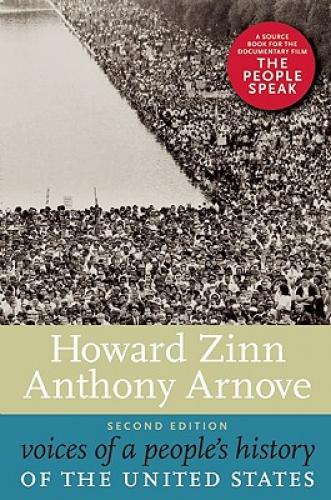
Voices of a People’s History of the United States by Howard Zinn and Anthony Arnove (Seven Stories Press).At one time, there was talk of making an HBO docudrama of People’s History with Zinn’s Hollywood champions Ben Affleck and Matt Damon. The plan was to have three two-hour segments with screenplays by Howard Fast (Spartcus), John Sayles (Amigo), and Paul Lucier. After the usual protracted film-business shenanigans, what came out of it was The People Speak(2009),which had a star-studded lineup, reading from letters, speeches, poems, and songs.
The source material was essentially to be found in Voices of a People’s History of the United States, a collection of firsthand accounts, journal entries, speeches, personal letters, and published opinion pieces from the nation’s history—including such people as Frederick Douglass, Patti Smith, George Jackson, Chief Joseph, Martin Luther King Jr., Plough Jogger, Sacco and Vanzetti, Bruce Springsteen, Mark Twain, Cesar Chavez, Leonard Pelletier, June Jordan, Walter Mosley, Paul Robeson, the Rosenbergs, and Malcolm X. Zinn and Arnove observe, “What is common to all of these voices is that they have mostly been shut out of the orthodox histories, the major media, the standard textbooks, the controlled culture … to create a passive citizenry… Whenever injustices have been remedied, wars halted, women and blacks and Native Americans given their due,” they write, “it has been because ‘unimportant’ people spoke up, organized, protested, and brought democracy alive.”
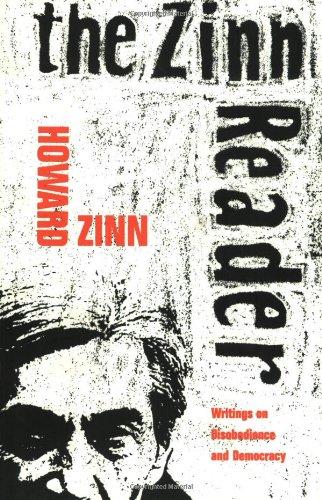
The Zinn Reader: Writings on Disobedience and Democracy by Howard Zinn (Seven Stories Press). This nearly 800-page compendium published in 1996 is divided into six sections, anthologizing a vast swath of Zinn’s essays probing his familiar concerns on war, race, politics, economic justice, and the study of history itself. It’s a useful survey of the broad scope of Zinn’s historiography.
Seven Stories has also published several standalone books drawn from The Zinn Reader on race, war, and terrorism.
The Howard Zinn Collection (Haymarket Books). Haymarket Books is a nonprofit, progressive book publisher, and a project of the Center for Economic Research and Social Change. Their credo is that activists need to take ideas, history, and politics into the many struggles for social justice today, so it is fitting that they have republished some of Zinn’s early works, including SNCC: The New Abolitionists, his study of the influential Student Nonviolent Coordinating Committee, and Vietnam: The Logic of Withdrawal, his convincing brief against the Vietnam War. The latter concludes with a speech written by Zinn that he proposed President Johnson should have given to lay out the case for ending the war. Imagine, if you can, LBJ or any American president intoning:
We have made an important decision. It is a decision based on a fundamental belief that human life is sacred, that peace is precious and that true power does not consist in the brute force of guns and bombs but in the economic well being of a free people.
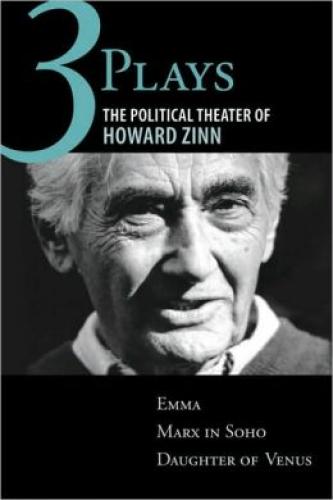
Three Plays: The Political Theater of Howard Zinn (Beacon Press). Zinn wrote three plays: Marx in Soho, which focused on the legacy of Karl Marx; Emma, which unpacks the character and the legend of early twentieth-century anarchist activist Emma Goldman; and Daughter of Venus, which probes boundaries of personal and social obligation. The volume includes a new introductory essay on political theater and prefaces to each of the plays.
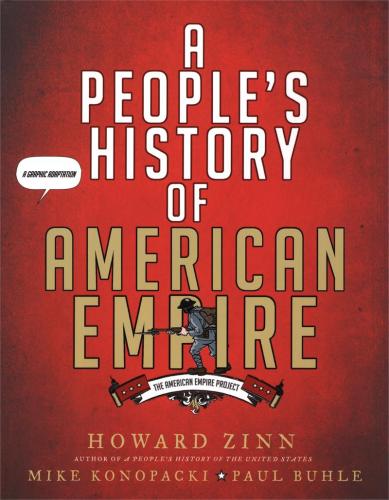
A People’s History of American Empire: A Graphic Adaptation by Howard Zinn (Metropolitan Books). This is an adaptation of A People’s History told in comic form with historian Paul Buhle, founding editor of the journal Radical America, and cartoonist Mike Konopacki. Narrated by Zinn, it opens with the events of 9/11 and then flashes back to key points of US expansionism from Wounded Knee to Iraq, stopping along the way at World War I, Central America, Vietnam, and the Iranian Revolution. The parallel narrative follows the story of Zinn, the son of poor Jewish immigrants, from his childhood in the tenements of Brooklyn slums to his status as one of most well-known historians in America.
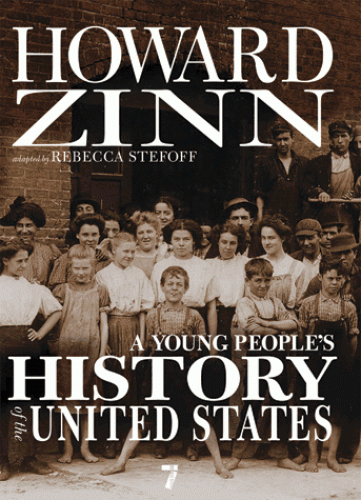
A Young People’s History of the United States: Columbus to the War on Terror by Howard Zinn and Rebecca Stefoff (Seven Stories Press). This is a new, revised, and updated single volume young-adult edition of Zinn’s magnum opus and a companion to the film iteration of The People Speak. Zinn wrote in a letter to the New York Times:
I want young people to understand that ours is a beautiful country, but it has been taken over by men who have no respect for human rights or constitutional liberties. Our people are basically decent and caring, and our highest ideals are expressed in the Declaration of Independence, which says that all of us have an equal right to “life, liberty, and the pursuit of happiness.” The history of our country, I point out in my book, is a striving, against corporate robber barons and war makers, to make those ideals a reality—and all of us, of whatever age, can find immense satisfaction in becoming part of that.
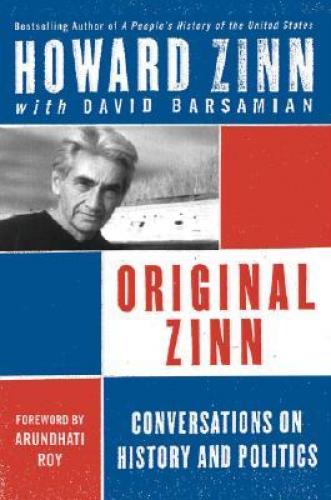
Original Zinn: Conversations on History and Politics (Harper Perennial). This book collects eight radio interviews with Zinn between August 2002 and February 2005 conducted by David Barsamian, founder of Alternative Radio. The book closes with the text of a speech by Zinn, “Against Discouragement,” which he presented at Spelman College in 2005.
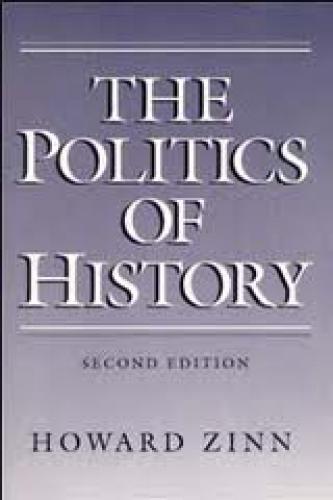
The Politics of History by Howard Zinn (University of Illinois Press). This volume is devoted to historiographical issues—about the writing of history and essays in history, attempts to begin to meet the criteria for a radical history as evidenced by the first essay. As Zinn writes, “My chief hope is to provoke more historical writing which is consciously activist on behalf of the kind of world which history has not yet disclosed, but perhaps hinted at. The first essay, “Knowledge as a Form of Power,” may be of less interest to general readers as Zinn presents his views on scholarship and the philosophy of history. There are specific essays dealing with the Ludlow Massacre and miners’ strike of 1913, Hiroshima, and the Allied bombing of the French town of Royan even after Nazi withdrawal—in which Zinn himself participated as a bombardier, later learning this mission was to test a new compound called napalm.
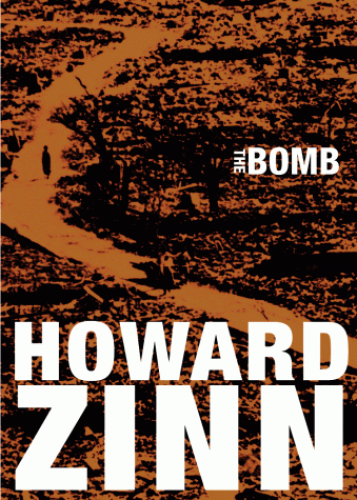
The Bomb by Howard Zinn (City Lights Open Media). This pamphlet weaves together Howard Zinn’s World War II experience in the aerial bombing of Royan, France, and his experience visiting Hiroshima and meeting survivors of the atomic attack. The Bomb was completed in January 2010 and was published on the sixty-fifth anniversary of the bombing of Hiroshima. Zinn’s anti-nuke argument is simple and poignant.
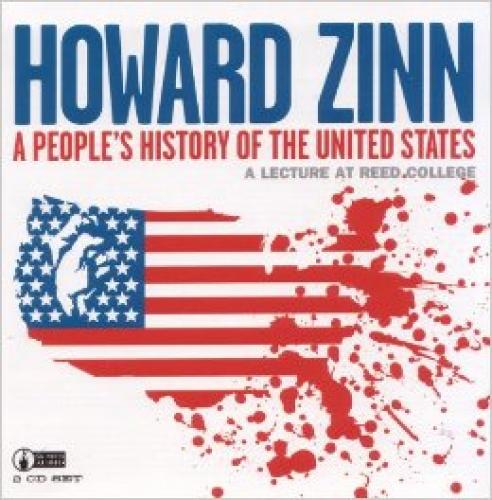
A People’s History of the United States: A Lecture at Reed College by Howard Zinn (AK Press). This lecture and discussion at Reed College was released as a two-CD set in 2001 and is a splendid showcase of Zinn’s professorial persona, both his passion and his humor. The thirty-two segments touch on “Machiavelli and Teaching,” “Professionalism and Morality,” “Class Struggle,” “The Conquest of the Philippines,” and “Corporate Welfare.”
A Eulogy for Howard Zinn
Close friend and comrade in arms Noam Chomsky eulogized Zinn:
Howard’s remarkable life and work are summarized best in his own words. His primary concern, he explained, was “the countless small actions of unknown people” that lie at the roots of “those great moments” that enter the historical record. … His life was always closely intertwined with his writings and innumerable talks and interviews. It was devoted, selflessly, to empowerment of the unknown people who brought about great moments. …
Whenever there was a struggle for peace and justice, Howard was there, on the front lines, unflagging in his enthusiasm, and inspiring in his integrity, engagement, eloquence and insight, light touch of humor in the face of adversity, dedication to non-violence, and sheer decency. It is hard even to imagine how many young people’s lives were touched, and how deeply, by his achievements, both in his work and his life.
